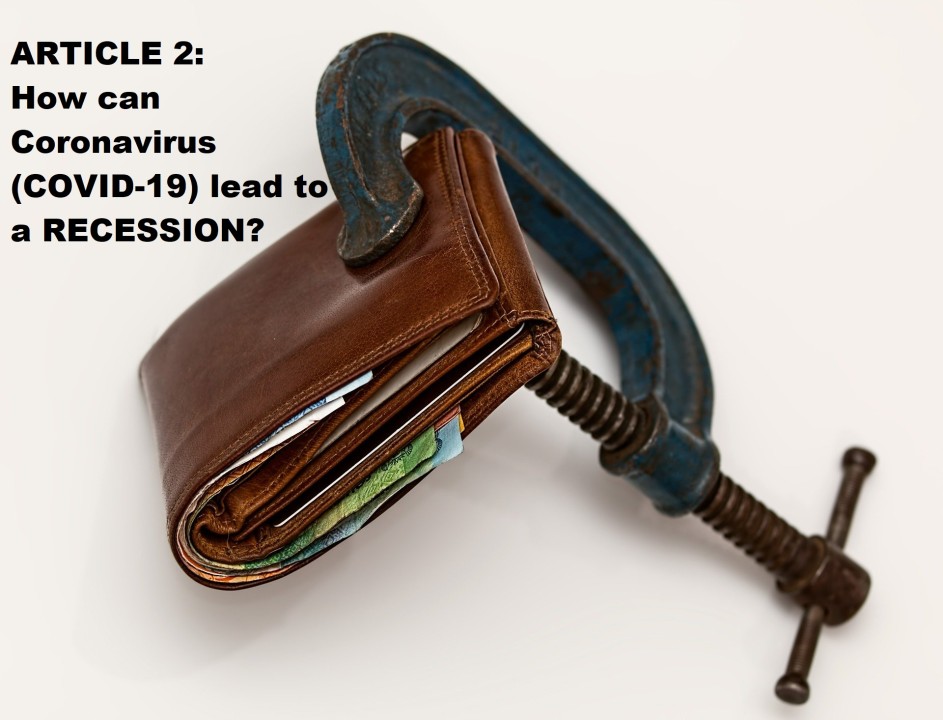
ARTICLE 2: How can Coronavirus (COVID-19) lead to a RECESSION? by Shane Hindocha
In these uncertain times, it is important to look ahead, stay attentive and proactively navigate your way through the turmoil.
My name is Shane Hindocha. I am a father, a husband, an active property investor & an entrepreneur. I have lived through 2 recessions already. If we are going down this route (recession) again, a blend of hindsight and foresight is welcomed. Whilst my outlook on life is generally positive, I will remain objective and then form an opinion.
My aim is to break complex information down into digestible and easy-to-understand formats…and in particular, how the current situation will affect property prices in the UK.
You can connect with me on the following platforms:
Follow me on Instagram: https://www.instagram.com/shanehindocha/
Follow me on Facebook: https://www.facebook.com/shane.hindocha
Follow me on Linked In: https://www.linkedin.com/in/shane-hindocha-6000a919/
Follow me on Twitter: https://twitter.com/shanehindocha
Follow me on Tik Tok: https://www.tiktok.com/@shane.hindocha
WHAT IS A RECESSION?
A period of temporary economic decline mainly observed as a slowdown in output and employment, generally identified by a fall in GDP in 2 successive quarters.
Recessions generally occur when there is a widespread drop in spending.
WHAT IS GDP?
GDP = Gross Domestic Product
It measures the value of economic activity within a country.
It is a number that expresses the worth of the output of a country in local currency.
How is it calculated?
It is the sum of the market values, or prices, of all final goods and services produced in an economy during a period of time.
So, if we are in a period when economic output contracts for two straight quarters…we will be in a recession. However, even if we’re in a recession right now, an official declaration may be months away.
HOW MANY RECESSIONS HAS UK HAD SO FAR?
Not including the one that we may currently go into…it looks like 13 recessions since 1430 (lasting ½ a year to 60 years in any 1 given recession).
The last 3 recessions lasted 1.25years / 5qtrs each:
1980 q1 – 1981 q1 (Early 80s Recession)
1990 q3 – 1991 q3 (Early 90s Recession)
2008 q2 – 2009 q2 (Great Recession)
ARE WE MOVING TOWARDS A RECESSSION NOW?
Travel bans.
Sporting events cancelled.
Mass gatherings prohibited.
Stock markets in freefall.
Deserted shopping malls.
Entire countries – Italy, Spain & now potentially UK – are in lockdown.
Widespread hiring freezes.
Job losses / pending job losses.
Strong indicators that there will be an economic decline.
POSITIVES
If history is any guide, the global economy will eventually recover from the Covid-19 pandemic…
...& in England especially, the money flows back with a vengeance in to the property market.
A lot of people became very wealthy by being in strong cash positions in previous recessions - buying low, holding…& waiting for market recovery and growth.
We have more experience in dealing with recessions considering we have been through 13 of them.
We are quicker to react than previously. Also, we have countries that are much further down the line in the coronavirus pandemic. Therefore, some evidence of whether their actions work to contain it can be adopted quicker by us.
Technology has improved, so certain businesses can operate remotely and there is an easier share of data now so people stay informed and up-to-date.
The property market has been uncertain since Brexit and we haven’t experienced inflated growth so prices are not over-valued (in comparison to 2008 property prices).
RICS surveyors have been harsher on their valuations and therefore the property prices have not raced ahead.
The mortgage LTVs (Loan-To-Values ie percentage loan on the property) that someone has borrowed on their property is a lower percentage loan compared to previous times. For example, previously you could get 100% LTV mortgages. My point is, with the property market not having over-inflated prices & people having more equity in their homes is a better position than an over-valued & over-leveraged market.
WHAT’S DIFFERENT THIS TIME?
In 2003, the outbreak of severe acute respiratory syndrome (SARS) did little damage globally. This new coronavirus is likely to do much more damage than SARS.
The banking system isn’t the source of the problem this time around. It isn’t the financial system incompetency, but more so practicality & functionality (or lack of!) that is driving this “recession”. If people are immobile and isolated, they cannot go to work, make money etc etc.
Conventional policy measures, such as cutting the cost of borrowing or lowering taxes usually are effective when there is a demand issue. These measures are capped in what they can do when there is a combined supply and demand issue.
We are a service-sector dominated economy. Much of the lost output may never be recovered. A great example I came across was Eg. If people do not go out to their weekly meal at their favourite local restaurant for the next 2 months, they are not going to eat out 4 times a week when the fear of infection has been lifted.
CONCLUSION
Less spending and less lending = signs of a slowing economy.
If people are not going out to: Events / Cinemas / Restaurants / Shops / Bars / Theatres / etc etc = less spending is happening in the economy.
If more people fall ill / go into isolation / lose their jobs / less people to service the economy etc = people feel nervous and they start to hold / save their money (in case they lose their jobs, in case their business collapses etc). If they are saving and holding on to their money....= less spending.
Less spending and less lending = signs of a slowing economy.
A slowing economy for 2 successive quarters = RECESSION.
However, fear not. There are people that have emerged from recessions in a better position than before entering it. Knowledge, preparation & calculated tactical moves will stand you in good stead. Stay tuned.
Stay positive and motivated.